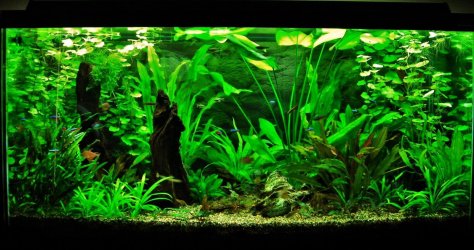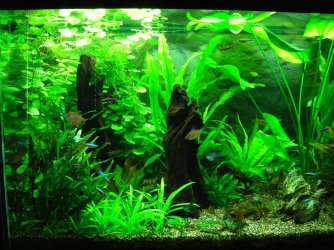Depends on how you define maddening. Mine is 400 GPD and takes around 35 minutes to produce 25 litres. Since I change over 200l per week I bought this as an upgrade from my previous system (which could manage 100GPD)I’m planning on buying a 150 GPD RODI system , 7-stage to really murder anything in the water. That should produce at a non-maddening pace.
You are using an out of date browser. It may not display this or other websites correctly.
You should upgrade or use an alternative browser.
You should upgrade or use an alternative browser.
What’s a must-have fish for a peaceful 75 gallon community?
- Thread starter CherryBerry670
- Start date
plebian
Fish Crazy
Please provide references.@CherryBerry670 the GH does matter to the well-being of fish, as every knowledgeable biologist will tell you. There are studies proving that lifespan of soft water species is related to the GH, and while some species have the ability to adapt, this is limited and depends upon the species and the values involved.
So I’m going to use a inch of planted tank substrate capped with about two inches of the black Petco sand.
This is not advisable with cories and loaches. These substrates (plant ones) cause bacterial issues, and substrate fish are down there with them and become susceptible. Also, black sand is not good for cories, it causes them to attempt to darken in order to blend in, and this is long-term stressful and weakening on the poor fish. If you intend substrate fish, inert aquarium sand in a natural (buff/brown) shade is best, including quality play sand which I've used for a decade with positive results. The plants will grow just as well too.
Don't use Excel. It is a toxic disinfectant, glutaraldehyde. It will kill some plants at the recommended dose, and it has the ability to kill plants, fish and bacteria. You have diffused CO2 anyway, that is enough of a risk for fish.
Please provide references.
Consult the biologists. You clearly will not believe anyhting I post, it is a waste of time. I only counter the misinformation to help those who may want to learn.
CherryBerry670
Fish Fanatic
Can I ask where you got the thing about Excel? I use it in all my tanks and it’s never done anything but help my plants. Same for the substrate. To be fair, most of my tanks have been heavily planted betta tanks and small 20-30 gallon communities, so that’s fairly different, but I’ve still never seen anything happen as a direct consequence of using the substrate or fertilizer.This is not advisable with cories and loaches. These substrates (plant ones) cause bacterial issues, and substrate fish are down there with them and become susceptible. Also, black sand is not good for cories, it causes them to attempt to darken in order to blend in, and this is long-term stressful and weakening on the poor fish. If you intend substrate fish, inert aquarium sand in a natural (buff/brown) shade is best, including quality play sand which I've used for a decade with positive results. The plants will grow just as well too.
Don't use Excel. It is a toxic disinfectant, glutaraldehyde. It will kill some plants at the recommended dose, and it has the ability to kill plants, fish and bacteria. You have diffused CO2 anyway, that is enough of a risk for fish.
I usually use pool filter sand in my tanks, per the forum, but it gets dirty extremely fast and I’m pretty sure it makes my fish duller in response as well. Might switch to regular Sterbai or panda Cories if albino fish are a problem on black, though. Don’t see why the loaches would have a problem on black sand.
Aquarium Co-Op does have a guide suggesting to use a air stone with my co2 for my fish, so I think I’ll probably toss one of those in to avoid killing them, should there be a end-of-tank dump.
Can I ask where you got the thing about Excel? I use it in all my tanks and it’s never done anything but help my plants.
The effects are well known in several forums, and a fact of science. By contrast, my opinion that this does not belong in an aquarium with fish is my personal opinion. Just look up what glutaraldehyde is and ask yourself if you really want your fish swimming in this. Maybe you do, but I don't and I feel it is only fair to caution people. In my view, anything that kills plants including (sometimes) algae has no place in an aquarium. This is just my view, but it may explain why in 30 years this approach has kept disease down to three (four if I count the toxic wood incident in 1997) times. The fact that Seachem or anyone says it is "safe" does not matter to me, I define safe differently. And like so many things we do to fish in tanks, it is so often way down the road that the fish finally succumbs and who can trace it back to this or that? Hard water for example slowly impedes the soft water fish's physiology, and calcium builds up blocking the kidneys. This may take 5 or 6 or 7 years, but it kills the fish at some point. A controlled experiment in Germany in the 1980's established that the lifespan of cardinal tetras was directly proportional to the level of GH. Then there are nitrates, which some still flaunt as "harmless," but we know that they slowly weaken the fish, and it becomes susceptible to disease it would otherwise not have, so this impacts its life too.
Same for the substrate. To be fair, most of my tanks have been heavily planted betta tanks and small 20-30 gallon communities, so that’s fairly different, but I’ve still never seen anything happen as a direct consequence of using the substrate or fertilizer.
But how would you know? If a cory after you've had it for say 1 or 2 years, dies, I suspect few of us wold have any idea why if we could not see external signs. Ian Fuller knows about cories, and he says never use these substrates because of the bacteria issue. I had an importer of wild fish in Vancouver tell me the same some years ago. These people know mor about this than I do, and I listen. I do not want to risk my fish just to have this or that plant. Enough plants will thrive like weeds in inert sand and fine gravel for that matter, without my risking the fish.
I usually use pool filter sand in my tanks, per the forum, but it gets dirty extremely fast and I’m pretty sure it makes my fish duller in response as well. Might switch to regular Sterbai or panda Cories if albino fish are a problem on black, though. Don’t see why the loaches would have a problem on black sand.
All cories have problems over black if they are not already black. I used play sand for a decade, and never had dirt or problems. Maybe this is more of the minimal approach benefits. My 115g tank with 60 cories never had the vacuumnear the sand, and if you poked into it the dust that came up was barely noticeable. I guess the cories are pretty good housekeepers when given what they need/like.
Aquarium Co-Op does have a guide suggesting to use a air stone with my co2 for my fish, so I think I’ll probably toss one of those in to avoid killing them, should there be a end-of-tank dump.
I agree on the dangers...but this is exactly my point in all of this...obviously there are serious risks with these extras. I had to increase the filter surface disturbance because of CO2 rebuilding during darkness and affecting my cories. It was obvious what was occurring. There was an article in PFK three or four years ago that evidence was gathering that CO2 does harm fish long-term in planted tanks. Not surprising, look at what CO2 is doing in the environment. And the level of CO2 by diffusion is way above what any of these fish would ever encounter in the habitats. Each to his own.
Here are a couple photos of my tanks along the way. No plant/soil substrate, just playsand (first photo) and fine gravel (second and third, before I was told about the cories). No CO2. I would not say these plants are not thriving without all the bells and whistles.
Attachments
Last edited:
CherryBerry670
Fish Fanatic
Ok, I’m off to Google about this. I’ve never really heard of anything like that happening, or had it happen: almost all of my fish lived out their full lifespan in the tank, some surpassing their normal lifespan. I am considering using topsoil for the substrate instead of a actual aquarium substrate, but I don’t really want to wake up one day to find my Cories or loaches have torn all the sand off and my tank is filled with soil.
Last edited:
Ok, I’m off to Google about this. I’ve never really heard of anything like that happening, or had it happen: almost all of my fish lived out their full lifespan in the tank, some surpassing their normal lifespan. I am considering using topsoil for the substrate instead of a actual aquarium substrate, but I don’t really want to wake up one day to find my Cories or loaches have torn all the sand off and my tank is filled with soil.
Cories and loaches dig, that is their inherent nature. Cories will upend themselves and the first third of the body will be vertically down, to give you an idea how deep. Loaches will dig down to the glass panel under several inches of any substrate. There was a thread about this just this morning. I am simply saying this is not a good idea, but it is your tank and fish.
The other thing is that the more we interfere in the biology or chemistry of an aquarium, the more there is to cause trouble. I have gone through this, and come to the obvious conclusion that the fish will be better off and I will have fewer problems the less I interfere. As someone said, Keep it simple.
plebian
Fish Crazy
Your arrogance is mind boggling. You spread as much misinformation as you "counter". I've linked some references regarding water hardness and the health of fish. Maybe you can learn something, though I doubt it.Consult the biologists. You clearly will not believe anyhting I post, it is a waste of time. I only counter the misinformation to help those who may want to learn.
Guppies and Bettas
Knowledgeable Biologist
Your guppies link shows hardness is indeed impacting reproduction. No results refer to health.Your arrogance is mind boggling. You spread as much misinformation as you "counter". I've linked some references regarding water hardness and the health of fish. Maybe you can learn something, though I doubt it.
Guppies and Bettas
Knowledgeable Biologist
Your knowledgeable biologist link does not refer to hardness (GH).
Try this:

Understanding water hardness
Water hardness — not the most exciting of subjects to try and fully understand. The extensive amount of terminology makes the subject seem endless and confusing in equal measure.
Similar threads
- Replies
- 5
- Views
- 796
- Replies
- 3
- Views
- 2K
- Replies
- 17
- Views
- 3K
- Replies
- 9
- Views
- 2K
- Replies
- 21
- Views
- 3K
Most reactions
-
 403
403 -
 176
176 -
 164
164 -
 158
158 -
 146
146 -
 141
141 -
 128
128 -
 124
124 -
 108
108 -
 85
85 -
 67
67 -
 64
64 -
 56
56 -
 51
51 -
F
48




